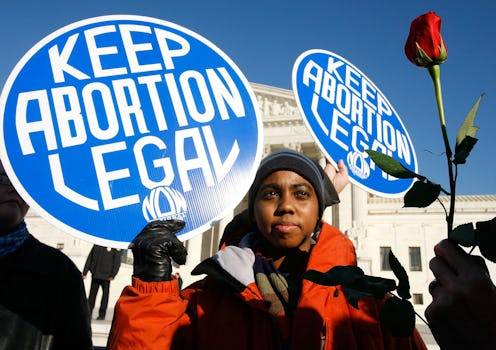News
SCOTUS Could Strip Abortion Rights Without Ever Overturning Roe V. Wade — Here's How

News of Justice Anthony Kennedy's departure from the Supreme Court last week was met with fears that his replacement with a more conservative justice would lead to the elimination of the constitutional right to an abortion. But the Supreme Court could ban abortion without ever explicitly dismantling Roe v. Wade — and it's made similar moves before.
"[Justices] don’t usually like to overrule precedents unless it’s a horrific decision that was clearly a mistake, because there’s fallout from overruling precedent," says Caroline Mala Corbin, a law professor at the University of Miami School of Law. "So if it’s not necessary to accomplish the results they’re seeking, they might operate a little more subtly in changing the law."
President Trump told Fox News' Maria Bartiromo over the weekend that individual states could hold all the power in determining the legality of abortion "at some point," since he plans to nominate a conservative justice to fill Kennedy's shoes. This statement reaffirmed his campaign promise to appoint Supreme Court justices who would overturn Roe v. Wade, but he could see that same outcome even if Roe remains intact.
If the Supreme Court redefines the standard for evaluating whether an abortion regulation is constitutional, or interprets the current standard in a way that allows most abortion restrictions to stand, legal experts note that states would have greater authority to strictly limit the procedure.
"They won’t necessarily come out and declare that they’ve eliminated constitutional protection for abortion," Corbin tells Bustle. "But they [could] modify the standard for evaluating the constitutionality of regulations and — surprise, surprise — conclude that most regulations satisfy their new standard."
Multiple abortion cases that could eventually reach the high Court are already working their way through the legal system. These cases include laws in Alabama, Arkansas, Kansas, and Texas that aim to outlaw the safest and most common method of abortion in the second trimester, as well as an Indiana law restricting access based on why a woman is seeking an abortion. But any case centered around an abortion regulation could be a vehicle for the Supreme Court to redefine the constitutional standards, according to Corbin.
The 1992 case Casey v. Planned Parenthood shows how the Supreme Court has already shifted those standards once before. The framework for evaluating the constitutionality of an abortion restriction under Roe had been based on trimester, but the Casey decision imposed a new standard centered around the concept of an "undue burden." Defined as a "substantial obstacle in the path of a woman seeking an abortion before the fetus attains viability," the "undue burden" principle blurred the lines of what regulations could be deemed unconstitutional.
So while Casey reaffirmed the right to an abortion by upholding the basic tenants of Roe, it also paved the way for the onslaught of restrictions that now require women in certain states to endure waiting periods, receive counseling, or get an ultrasound before obtaining an abortion.
The 2016 Whole Woman's Health v. Hellerstedt decision later broadened what qualified as an "undue burden." But a future ruling from the Supreme Court could move things in the opposite direction: For example, if the Supreme Court ruled that legislation banning abortion at the sign of a heartbeat was constitutional, states would be able to ban abortion at six weeks — before most women even know they're pregnant. Such a ruling would effectively outlaw abortion without the court ever having to declare that it's unconstitutional.
Of course, no one knows what the future holds. But whether the court chooses to get rid of Roe entirely or slowly dismantle it, either move would "erode decades of precedent and could have an enormous impact on the real-world ability of women to be able to access health care," says Genevieve Scott, a senior staff attorney at the Center for Reproductive Rights.
That's why, she says, "it is absolutely critical that the Senate ensures that Anthony Kennedy be replaced with a justice who will affirm the fundamental rights of all."